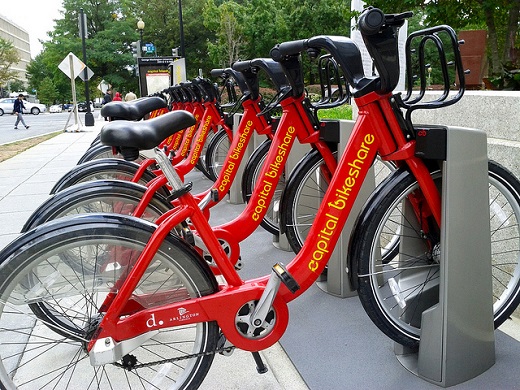
Opt Out of Capital Bikeshare’s Forced Arbitration Clause
Image via Zach Copley on Flickr
By Dani Zylberberg
Thornton Fellow
In its most recent update to its “User Agreement,” Capital Bikeshare—the hugely popular bike program in the Washington, D.C. area—has slipped in a forced arbitration clause and class action ban that significantly affects the rights of Bikeshare members. In fact, this new “User Agreement” only benefits Capital Bikeshare, not its members. But if you are a Capital Bikeshare member there is something you can do about it: Opt Out!
Capital Bikeshare’s new “User Agreement” forces users to give up their right to go to court, and instead sends dispute that would typically be heard by a court into arbitration, which almost always favors corporations over consumers. That’s because arbitrators—who are often hired again and again by corporations to hear these disputes—unsurprisingly tend to rule in favor of the company that is bringing the arbitrator repeat business.
But that’s not the only reason arbitration is bad for consumers. It also provides fewer safeguards, restricts access to evidence, and can end up costing you hundreds or even thousands of dollars if you lose. And because forced arbitration is more secretive than litigating in a public court, corporations can hide serious safety concerns from the public for years. Imagine if Capital Bikeshare could keep certain bike defects from its customers, keeping you from knowing about preventable injuries! That’s a real danger under the company’s new agreement.
In addition to keeping customers out of court, Capital Bikeshare’s class action ban also prevents them from banding with other users to challenge misconduct. For example, if Bikeshare was to alter its coding to charge late fees after 28 minutes—rather than 30:01 minutes, as its user agreement dictates—it wouldn’t make sense for one individual to arbitrate a $1.50 claim. But it would potentially allow Capital Bikeshare to unjustly collect hundreds of thousands of dollars in fees because Bikeshare’s members cannot challenge its unlawful conduct as part of a class action.
In fact, these policies are such a bad idea that Capital Bikeshare makes sure to excuse itself from arbitration when enforcing its own intellectual property rights. This double standard shows that Capital Bikeshare is more interested in protecting itself than in making things fair for its members.
Unfortunately, more and more corporations are slipping forced arbitration clauses and class action bans into their user agreements. But Capital Bikeshare isn’t just a corporation—it is a service provided by the cities of Washington, DC, Arlington, Alexandria and the counties of Montgomery and Fairfax. It is shameful for the region’s governments to protect themselves and their corporate partners over the public they serve. And the timing of the changes in the agreement likely isn’t coincidental. By sending out notice on the Friday before a long New Year’s weekend, when most of us would rather be sipping champagne with friends and family than reading through yet another lengthy corporate agreement, Capital Bikeshare obviously hoped the significant changes it has made to your rights would slip through the cracks.
But you can do something about it: Opt out! And do it quickly.
Capital Bikeshare’s User Agreement allows its members to avoid this arbitration clause by following these simple steps within thirty days of your first use of its service:
- From the email account you used to register with Capital Bikeshare, address an email to legal@motivateco.com;
- In the subject line write “CAPITAL BIKESHARE ARBITRATION AND CLASS ACTION WAIVER OPT-OUT”
- In the body of your email write, “I opt out of Arbitration and the Class Action Waiver” and optionally include your member id if you have it handy.
- Send the email.
Although this also waives your right to force arbitration upon Capital Bikeshare in the event of any dispute, it doesn’t prevent you and Capital Bikeshare from mutually agreeing to use arbitration if that is what you both desire at the time. If arbitration will really be to both your benefits—as corporations often argue—then it will be a no-brainer for Capital Bikeshare to arbitrate whatever claims it or you may have.
In the meantime, though, you can start the New Year off by resolving to protect your right to your day in court by telling Capital Bikeshare “Thanks, but no thanks!” when it comes to forced arbitration.

